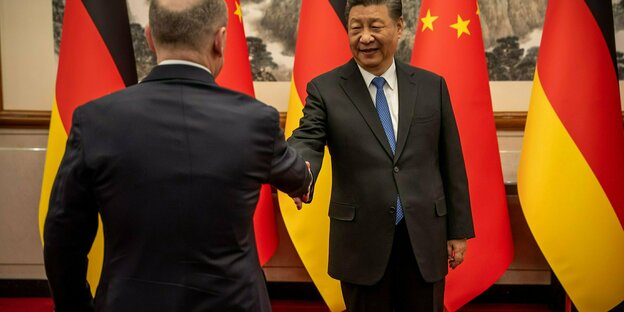According to Olaf Scholz, Xi Jinping wants to support a peace conference in Ukraine. China expert Bütikofer warns of “dwindling.”

Federal Chancellor Olaf Scholz at the reception of Chinese President Xi Jinping in Beijing on Tuesday Photo: Michael Kappeler/dpa
BERLIN/BRUSSELS taz | During his talks in Beijing at the end of his three-day trip to China, Chancellor Olaf Scholz (SPD) claimed to have made progress regarding the Russian war of aggression in Ukraine. For this reason, China supports a peace conference scheduled for June in Switzerland, although Russia has already canceled its participation.
“China and Germany want to support and encourage peace efforts in Ukraine,” Scholz said Tuesday after a more than three-hour meeting with President Xi Jinping and a subsequent conversation with Premier Li Qiang, according to Reuters.
Both sides are willing to “intensely and positively coordinate” the possible direction of the conference and future international peace conferences. Scholz said he had asked Xi to influence Russia so that President Vladimir Putin “finally cancels his insane campaign, withdraws his troops and ends this terrible war.”
Scholz did not say to what extent Xi would be willing to comply with this demand from Western governments, which has been known since the outbreak of the war. China had already presented a vague peace plan, which Ukraine and Western governments rejected as unilateral in favor of Moscow.
Emphasis on preserving sovereignty
The Chancellor now stressed that it is good that some points have been agreed. She agrees with Xi that preserving sovereignty and territorial integrity are necessary foundations for a sustainable peace order.
Beijing itself uses this argument in its relations with Taiwan, which it considers a separatist province of China and therefore blames for the tensions. Scholz was expected to ask Beijing to drop its threats to conquer the island. Beijing itself has never condemned the Russian attack on Ukraine and the violation of its sovereignty.
In Shanghai, Scholz had also previously criticized the supply of so-called dual-use goods from China, which can be used both civilly and militarily and thus by Russia for the war in Ukraine. According to a statement from Beijing, Xi himself said that China was not a party to or involved in the war. However, since the start of the war, China and Russia have increased their economic cooperation and deepened their strategic partnership.
According to dpa, Xi presented four vague principles to avoid an escalation of the war in Ukraine. Accordingly, peace and stability must be given more priority, more efforts must be made to alleviate the situation and conditions must be created to restore peace. The negative consequences for the global economy should also be reduced.
Bütikofer: “Scholz has become smaller”
On his trip to China, which initially took him to Chongqing and Shanghai, Scholz was accompanied in part by Federal Environment Minister Steffi Lemke, Agriculture Minister Cem Özdemir (both from the Greens), and Transport Minister , Volker Wissing (FDP), as well as a business delegation.
Both governments agreed on a joint action plan for cooperation on recycling and resource efficiency. The plan calls for high-level government meetings once a year to maintain a strategic dialogue on the circular economy. These are materials such as plastic and metals, as well as product groups such as packaging or batteries. A declaration of intent for cooperation in the field of automated driving was also signed.
In response to the Chancellor's trip, MEP and China expert Reinhard Bütikofer (Greens) warned against too close a connection between Germany and Europe with China. “In the long term, China is not pursuing a partnership strategy, but rather a hegemonic strategy,” Bütikofer told reporters in Brussels on Monday evening.
According to Bütikofer, Scholz should have focused primarily on derisking, i.e. reducing dependencies, during his visit. Instead, he first visited economic metropolises and produced beautiful photographs. He also refrained from bringing with him associations and think tanks critical of China.
“Scholz would have had the opportunity to present himself in China as a representative of European determination. He did not take advantage of this opportunity. This overshadows it,” says Bütikofer.
